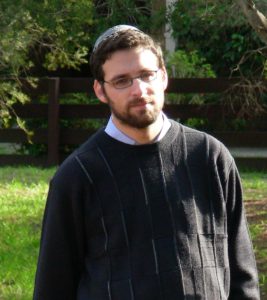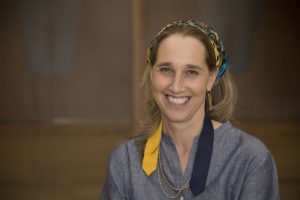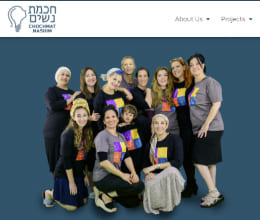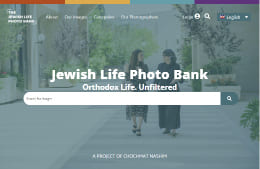Originally published in The Jerusalem Post Magazine, June 7, 2018
“Women’s voices have been generally missing from the great Jewish discussion that takes part within our communities. For millennia, the corpus of both Jewish law and thought has included the perspectives and outlooks of men alone. Today, we are witnessing an important renaissance, allowing us to benefit from the distinctiveness and singularity that women bring to the table. I believe that their voices allow us to view many of the pressing issues facing Judaism today from a fresh perspective. I believe that anyone who took part in this significant Shabbat, and went to hear one of the women who spoke throughout our various communities, was indeed impressed by the need for female Torah erudition.”

So said Rabbi Yoni Rosensweig, who teaches at Midreshet Lindenbaum and is the rabbi of the Netzach Menashe community in Beit Shemesh. His congregation hosted Dr. Penina Neuwirth for Shabbat Dorshot Tov, which, in April, saw 80 women Torah scholars take to podiums in Orthodox synagogues across Israel. Dorshot Tov, and the extent to which it has grown and is supported by so many Orthodox rabbis and communities, is a testament to the increasing acceptance of women’s Torah leadership in Orthodoxy.
This communal acceptance is a result of a number of factors unique to Israel, which together create an atmosphere of opportunity for women’s leadership. Many are the individuals, institutions, and organizations who are working to make women’s Torah and leadership a normative part of Judaism and Israeli society. This piece is the first in a series that will look at the phenomenon of women’s leadership, meet the women at the heart of this shift, and explore why this movement is good for the Jews.
While there is no shortage of female teachers or lecturers, and there certainly are and have long been female scholars, the opportunity to shape Jewish law and policy has been largely closed to them. Men studied the law and men made the law.
However, the past three decades have seen a major shift in women’s access to Torah study, with numerous institutions providing women with deep education in Jewish law. Moreover, in Israel, innovative trailblazers are constructing creative positions in which women can apply this knowledge.
What has led to this shift? Some claim that it is born from the need for women in leadership positions, for the benefit of both the community and women themselves.

Yael Rockman, executive director of Kolech, a prominent Israeli Orthodox feminist organization, and initiator of Dorshot Tov, explains: “In general society, women are analysts and judges. For religious people, Judaism is a huge part of our lives. If we prevent women from fully participating in Judaism, we create a reality where a woman can fully express herself and serve her community in her secular life, but is stifled Jewishly. This kind of dissonance is unhealthy and won’t last. For a thriving Jewish community, we must resolve this tension. There is room for women leaders. We need to give them ways to participate in the community. Otherwise, we will lose the next generation.”
Indeed, institutions such as Matan, Beit Midrash Harel, Midreshet Lindenbaum, Midreshet Ein Hanatziv in Ma’aleh Gilboah, and Nishmat — to name a few — all boast programs that teach women Jewish law at high levels, and provide certification after rigorous testing. Women’s midrashot, the women’s educational counterpart to the men’s yeshiva, are packed with hundreds of young women studying Jewish texts, weaving themselves into the legacy of Jewish discourse.
Those familiar with the debate surrounding women’s scholarship and leadership in the Diaspora (specifically on the question of Orthodox women rabbis) may be surprised by the flourishing of women’s opportunities in Israel. It is important to note that there is a significant difference in the approach to and acceptance of women’s learning and leadership in Orthodoxy in Israel as compared to the United States. A number of factors lead to this different reality.
First: the model of leadership. In the Diaspora, the position of rabbi is often pastoral. In that capacity, he — for in Orthodox circles, the rabbi is virtually always male — is often a communal leader who heads a synagogue, is paid by the community, and serves as the address for the community’s questions and advice. His wife, by virtue of being married to the rabbi, is often included as an unpaid adjunct of the position and is often expected, depending on her skill set and availability, to host, give classes, spiritually advise her female congregants, attend life cycle events, and be a visible and active part of the community.
In Israel, however, for most religious Jews, the synagogue is simply where one goes to pray. Religious social life in Israel is not centered around the synagogue, the way it is in the Diaspora. There may or may not be a designated rabbi who gives sermons from the pulpit, but rarely would everyone in the congregation turn to him for guidance. His position is not a full-time one, except perhaps in shuls that purposely implement the Diaspora model.
The difference in leadership models between Israel and the Diaspora means that not only is there far less competition for the pastoral rabbinic roles, but also the communal structure is not at risk of upheaval when women step up to play a role in communal leadership.

The second major difference is that there is no separation between religion and state in Israel. Many public, state-funded positions in Israel have primarily been open to those who have been ordained. These positions include city rabbis, spiritual guidance of educational institutions, rabbis of hospitals, heads of religious councils, rabbinic court directors, rabbinic court judges, kashrut supervisors, army chaplains, and many more.
And while rabbinic roles in the Diaspora affect only those within the local and larger Orthodox community, in Israel, the lack of separation of religion and state means that marriage, divorce, conversion and even burial are government services. Each aspect of these services has far-reaching influence on women’s lives and yet, because they fall under the realm of “religion”, women have had no opportunity to influence them.
Until recently, all of these positions had been closed to women — regardless of whether the positions were rabbinic or clerical and administrative in nature. Because these positions are state-funded, however, they are subject to Israel’s civil law, which explicitly outlaws discrimination.
Enter Israel’s NGOs that use Israel’s civil law to open doors for women in religious and communal services. Through strategic discrimination lawsuits filed with the Supreme Court, they have forced the state rabbinical courts and Ministry of Religious Services to open certain positions to women. These include kashrut supervisors, rabbinic court advocates, rabbinic court directors and, in the latest turn of events, legal advisors to the the rabbinical courts. The position of legal advisor is particularly influential, since rabbinical judges must not issue rulings that contravene Israeli law. Legal advisers review and insist on changes to important and precedent-setting rulings.
These efforts to increase women’s representation in religious services have born fruit: putting women in positions of influence has improved not only the rulings that emerge from the rabbinic courts, but even their functionality.
In 2013, a new law, stating that at least four of the 11 seats on the committee to elect rabbinic court judges must be filled by women, changed the dynamic of this committee. The appointed women fought against the corruption, nepotism and political deal-making that had been rampant. The real difference, however, came with the appointment of rabbinical court advocate Dr. Rachel Levmore, whose vast knowledge of Jewish law and passionate commitment to agunot led her to spend hundreds of hours vetting potential candidates. As a result, the committee succeeded in electing 22 new judges after nearly eight years of dysfunction and stalemate in which no new judges were elected.
Since Dr. Levmore’s tenure ended in 2016, however, the committee has once again devolved into a stalemate of politics, with no new judges elected, causing a backlog in cases and prolonging the suffering of those whose cases gather dust. Her story suggests that while having women on committees changes dynamics, having learned women on committees changes practice.
The role of rabbinic court advocate was one of the positions previously open only to men. This meant that a woman seeking divorce was often the sole woman in the room with six men, two of whom were her direct opposition. In 1991, Ohr Torah Stone (OTS), a network of Modern Orthodox educational institutions, approached the Chief Rabbinate about the need for women advocates but was promptly turned down. It wasn’t until OTS went to the Supreme Court that a Knesset bill amended the law to allow for women to practice as advocates in the rabbinical court. When the first class of toanot graduated from the Monica Dennis Goldberg School for Women Advocates, the Rabbinate contested their credentials, and OTS again took them to court. Finally, in 1994, the Rabbinate recognized the program and its graduates.
According to Dr. Levmore, women’s experiences in Israeli courts improved dramatically when women were introduced as halakhic and legal representatives. “When women hold official positions, the concerns of those women who appear in court are more likely to be heard.
Now, nearly 30 years later, the Rabbinate refers cases to Yad La’Isha, an organization that employs toanot who represent women denied a divorce, in recognition of their professionalism and competency.
As women’s participation in the elite committees and courtrooms bring about trickle-down change, others are changing the way women engage with their own religious practice from the bottom up.
Initially, both toanot and yoatzot faced opposition, despite the need for their services. But, social change develops at its own pace, and now yoatzot and toanot have become entrenched in mainstream Israeli communities. With time, people are growing used to seeing women as scholars and even decisors of Jewish law.
Perhaps the largest contributor to this normalization is the breadth of opportunity for women’s learning here in Israel. Hundreds of women study Jewish law in high-level programs, some of them passing the same exams administered to men by the Rabbinate.
Recently, the Susi Bradfield Women’s Institute of Halakhic Leadership (WIHL) at Midreshet Lindenbaum certified two women as Manhigot Ruchaniyot and Morot Hora’ah, qualifying them to advise on matters of Jewish law and serve as spiritual leaders to the Jewish people. After successful completion of the five-year program and rigorous written examinations, these two women join six others who completed the comprehensive training in high-level halakhic curricula addressing kashrut, Shabbat, family purity, mourning, marriage, fertility and more.
While far from being widely accepted, certification of women as halachic decisors is not as controversial in Israel as in the US. Moreover, rabbis acknowledge that Jewish law does not preclude women as leaders. Rabbi Nachum Rabinovich, head of Yeshivat Birkat Moshe in Ma’aleh Adumim, writes in Mesilat Levavchem, a work of Halachic-philosophical essays, that according to the majority of halachic authorities, there is no halachic problem with women serving as judges and therefore no problem with them accepting other leadership roles.
Rockman echoes this sentiment. “The challenges for women leadership aren’t in halacha, they are in the system. Girls start learning Talmud at a much later age, if at all. Their education in Judaism diverges at a certain point. There are no full time Yeshivot for women. In addition, women are locked out of many positions and cannot easily make Torah learning into their profession. Then there are the social barriers, people are not used to seeing women in leadership positions, and they oppose it without knowing the halachot. This is one of the reasons we initiated Dorshot Tov and other programming, to bring the scholarship of women to the wider Orthodox community and to help these women find professional positions.”
This is the power of visibility and representation. Communal leaders become such because their authority, expertise and leadership are recognized by the community who adopt them as their guides. As more women become increasingly visible in these roles, people will begin turning to them at higher rates, as many are already doing now.
Undeniably, the existence of women leaders and scholars enables women to better practice and engage with their Judaism. Also undeniably, women’s informed involvement forces the system to acknowledge women’s needs and experiences, and take them into consideration when operating in practice. In the next part of this series, we will meet these game-changing women and explore just how much they have already done to benefit Jewish and Israeli society, and how much farther we still have to go.


